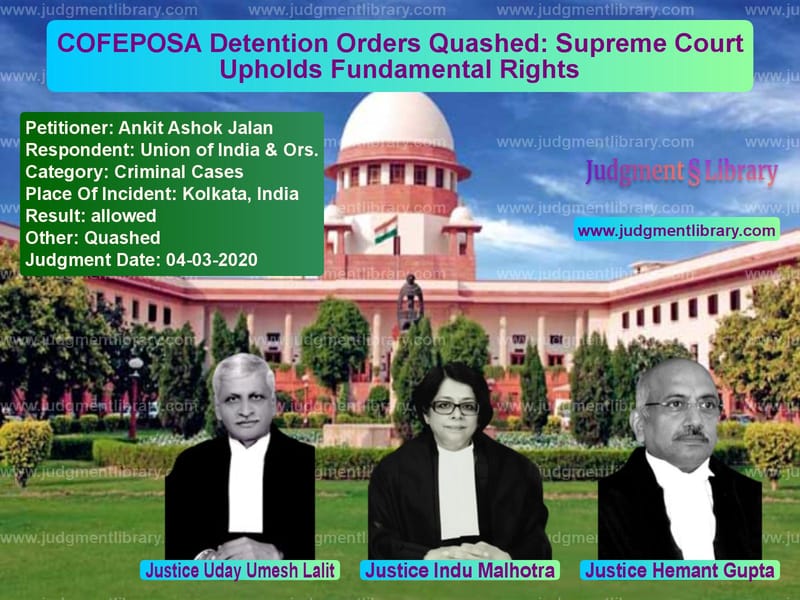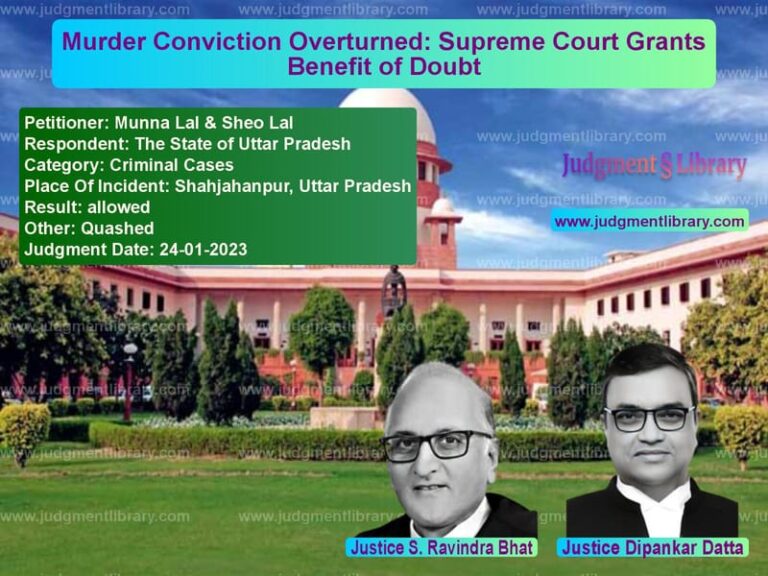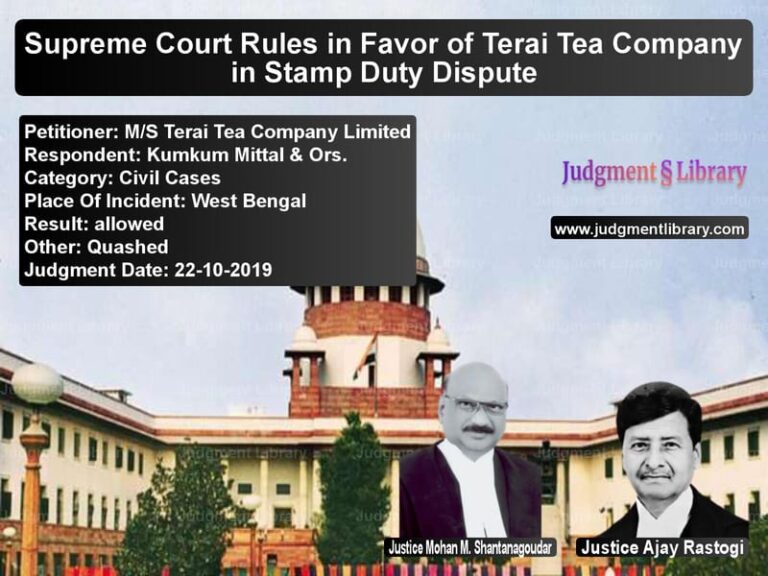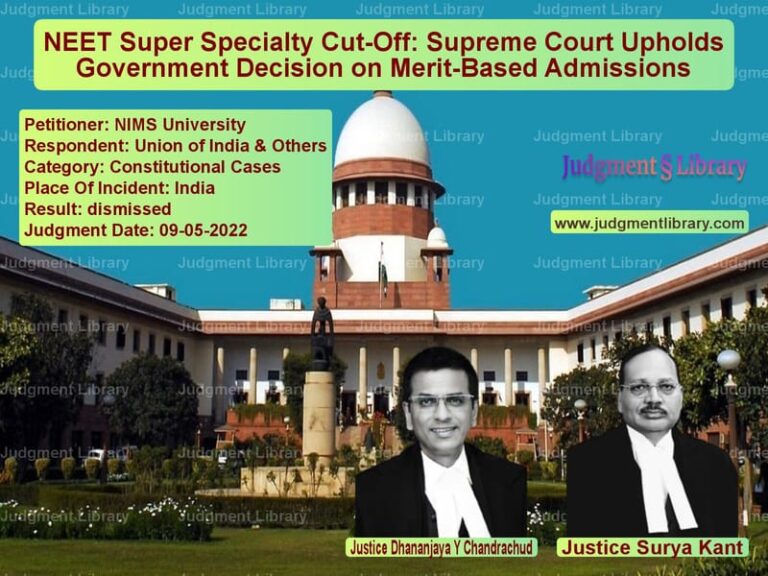COFEPOSA Detention Orders Quashed: Supreme Court Upholds Fundamental Rights
The Supreme Court of India, in a landmark judgment delivered on March 4, 2020, ruled in favor of Ankit Ashok Jalan and quashed the detention orders issued under the Conservation of Foreign Exchange and Prevention of Smuggling Activities Act, 1974 (COFEPOSA). The ruling established critical legal precedents regarding the expeditious consideration of representations by detenues, reinforcing the fundamental rights enshrined in the Indian Constitution.
This case arose from the preventive detention of the petitioner, who was accused of involvement in smuggling activities. The Union of India had detained him under COFEPOSA, citing the need to prevent him from engaging in illicit trade practices. However, the petitioner challenged the detention, arguing that his constitutional rights had been violated due to an unreasonable delay in considering his representation.
Background of the Case
The detention orders against Ankit Ashok Jalan were issued on July 1, 2019, under Section 3(1) of COFEPOSA by the Joint Secretary to the Government of India. The detenues were served with the detention orders and related documents on July 2, 2019. They submitted their representation against the detention on July 17, 2019, seeking disclosure of key evidence, including CCTV footage that allegedly played a role in their arrest.
The detaining authority did not act on the representation for an extended period, deferring consideration until after the Central Advisory Board had reviewed the case. This led to a substantial delay, with the final decision only being communicated on January 14, 2020. The detenues argued that this delay violated their rights under Article 22(5) of the Indian Constitution, which mandates prompt consideration of representations in preventive detention cases.
Legal Arguments Presented
Petitioner’s Arguments
- The petitioner contended that the delay in considering his representation was unconstitutional. He argued that Article 22(5) mandates prompt review, and any unwarranted delay vitiates the detention.
- The petitioner emphasized that the detaining authority had an independent obligation to review representations and could not defer its decision pending the Advisory Board’s opinion.
- The petitioner relied on precedents such as Pankaj Kumar Chakrabarty v. State of West Bengal and Jayanarayan Sukul v. State of West Bengal, which affirmed that any unexplained delay in handling a detenue’s representation renders the detention illegal.
- The petitioner further argued that procedural safeguards in preventive detention laws are crucial since detainees do not get the same rights as those accused in regular criminal trials.
Respondent’s Arguments
- The Union of India defended the detention, arguing that the delay in reviewing the representation was justified as the government was awaiting the Central Advisory Board’s recommendations.
- The respondents cited the Supreme Court ruling in K.M. Abdulla Kunhi v. Union of India, which allowed the government to defer decisions on representations until after the Advisory Board had reviewed the case.
- The Union further contended that the detention was based on concrete evidence of smuggling activities and that the detenue posed a continuing threat to national economic security.
- They maintained that procedural lapses, if any, were not significant enough to warrant quashing the detention.
Supreme Court’s Observations
1. Delay in Consideration of Representation
The Supreme Court emphasized that timely consideration of detenues’ representations is an essential safeguard in preventive detention cases. Citing Pankaj Kumar Chakrabarty, the Court stated:
“The representation of the detenue must be considered with utmost promptness and cannot be kept pending indefinitely.”
The Court found that the delay from November 27, 2019, to January 14, 2020, was excessive and unjustified.
2. Independent Obligation of the Detaining Authority
The Court distinguished the current case from K.M. Abdulla Kunhi, ruling that while the government may defer its decision until the Advisory Board’s report, the detaining authority must decide independently:
“The obligation of the detaining authority to consider the detenue’s representation is independent of the Advisory Board’s report.”
3. Violation of Article 22(5)
The Court reiterated that preventive detention laws must be strictly interpreted, ensuring that procedural safeguards are not diluted. It observed:
“Article 22(5) of the Constitution mandates that a detenue’s representation must be considered as soon as possible, and any unreasonable delay renders the detention unconstitutional.”
The Court held that the prolonged inaction violated the detenue’s fundamental rights.
4. Quashing the Detention Orders
Given the delay and failure to adhere to constitutional safeguards, the Supreme Court ruled that the detention orders were illegal and must be quashed.
Final Judgment
The Supreme Court allowed the writ petition and quashed the detention orders, directing the immediate release of the detenues:
“Since the delay in considering the detenues’ representation violates their constitutional rights under Article 22(5), the detention orders are hereby quashed.”
Implications of the Judgment
- The ruling reinforces the principle that preventive detention laws must be strictly interpreted, with procedural safeguards being rigorously followed.
- It establishes that the detaining authority cannot indefinitely delay representation review by citing pending Advisory Board reports.
- The judgment strengthens detainees’ rights under Article 22(5), ensuring prompt and fair consideration of representations.
- The decision sets a precedent for future preventive detention cases, limiting the scope for arbitrary state action.
Petitioner Name: Ankit Ashok Jalan.Respondent Name: Union of India & Ors..Judgment By: Justice Uday Umesh Lalit, Justice Indu Malhotra, Justice Hemant Gupta.Place Of Incident: Kolkata, India.Judgment Date: 04-03-2020.
Don’t miss out on the full details! Download the complete judgment in PDF format below and gain valuable insights instantly!
Download Judgment: Ankit Ashok Jalan vs Union of India & Ors Supreme Court of India Judgment Dated 04-03-2020.pdf
Direct Downlaod Judgment: Direct downlaod this Judgment
See all petitions in Bail and Anticipatory Bail
See all petitions in Judgment by Uday Umesh Lalit
See all petitions in Judgment by Indu Malhotra
See all petitions in Judgment by Hemant Gupta
See all petitions in allowed
See all petitions in Quashed
See all petitions in supreme court of India judgments March 2020
See all petitions in 2020 judgments
See all posts in Criminal Cases Category
See all allowed petitions in Criminal Cases Category
See all Dismissed petitions in Criminal Cases Category
See all partially allowed petitions in Criminal Cases Category







